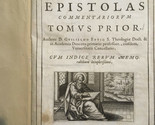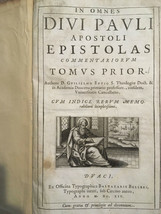Rendered at 10:53:47 05/06/25
Free Shipping
1614 "In Omnes Divi Pauli Apostoli Epistolas Commentariorum Tomus Prior" 1st Ed
Shipping options
Seller handling time is 2 business days Details
FREE in United States
Offer policy
OBO - Seller accepts offers on this item.
Details
Return policy
Partial refund available within 30 days
Purchase protection
Payment options
PayPal accepted
PayPal Credit accepted
Venmo accepted
PayPal, MasterCard, Visa, Discover, and American Express accepted
Maestro accepted
Amazon Pay accepted
Nuvei accepted
Shipping options
Seller handling time is 2 business days Details
FREE in United States
Offer policy
OBO - Seller accepts offers on this item.
Details
Return policy
Partial refund available within 30 days
Purchase protection
Payment options
PayPal accepted
PayPal Credit accepted
Venmo accepted
PayPal, MasterCard, Visa, Discover, and American Express accepted
Maestro accepted
Amazon Pay accepted
Nuvei accepted
Item traits
| Category: | |
|---|---|
| Quantity Available: |
Only one in stock, order soon |
| Condition: |
Unspecified by seller, may be new. |
| Binding: |
Leather |
| Special Attributes: |
1st Edition |
| Year Printed: |
1614 |
| Original/Facsimile: |
Original |
| Subject: |
Religion & Spirituality |
| Seller Notes: |
“Rare 1614 1st editions of this very important work. Good Condition.” |
Listing details
| Seller policies: | |
|---|---|
| Shipping discount: |
Seller pays shipping for this item. |
| Posted for sale: |
More than a week ago |
| Item number: |
1293357002 |
Item description
Rare 1614 First Edition of
"In Omnes Divi Pauli Apostoli Epistolas Commentariorum Tomus Prior"
William Hessels van Est (1542–1613), aka Guilielmus Estius
1614 1st editions of this commentary are very scarce and
very desirable.
Very important work in Latin by Willem Hessels van Est, a
16th-century Dutch philosophy scholar who is most-remembered for his important
commentaries on the Epistles of Saint Paul.
This first edition features a title page vignette of Saint Paul writing his
letters. While the complete commentary covers each of the New Testament
letters, this volume includes the books through Galatians.
"IN OMNES
DIVI PAULI APOSTOLI EPISTOLAS COMMENTARIORUM TOMUS PRIOR"
Authore D. Guilielmo Estio, s . Theologiae Doct. in Academia Duacena
primario professore, ejusdem Universitatis Cancellario.
Duaci,
Ex Officina
Typographica Baltazaris
Belleri, Typographi jurati,
sub Circino aureo.
ANNO M. DC.
XIV.
Cum gratia
privilegio ad decennium.
Details:
Condition very good. Binding in leather - tight
secure. No pages missing. Now writing or marks on pages. Few damp spots and little foxing. Last 5 pages have a small hole right in the middle.Very sold book.
One Exlibris Bookplate – Thomas Milles (1671–1740) Church of Ireland
Bishop of Waterford
and Lismore.
One Exlibris Bookplate inside front cover.
Language: Latin
FOLIO Size: 13.5” X 9”
(34cm x 23cm)
Very Rare Book. Important Theological Work. Owned by Thomas Milles (1671–1740) Church of Ireland
Bishop of Waterford
and Lismore.
William Hessels van Est (1542–1613), or Guilielmus Estius,
from a Catholic family in Gorinchem or Gorcum (Holland), had obtained the
degree of master of arts at the Louvain Pedagogy of the Falcon in 1561,
whereafter he started studying theology at the Pope’s College in Louvain. Michael
Baius, the president of the Pope’s College, was among his most important
teachers, together with John Hessels (both Baius and Hessels were
representatives of the outspoken Augustinian faction of the faculty), Josse
Ravesteyn, or ‘Tiletanus’, (continuing the old Augustino-thomistic line of
Ruard Tapper), in addition to Cornelius Jansenius of Ghent. As a student of
theology, Estius had also contributed to the edition of Augustine’s works, in
particular to the ninth volume. At the establishment of the Louvain King’s
College by Philip II in 1579, founded in order to provide the country with a
new generation of good priests, Estius was appointed as a professor of
theology. On 18 April 1579 he received a prebend in St. Peter’s church in Louvain. On 22 November 1580,
he was promoted to doctor of theology.
In 1582 Estius moved to the University of Douai,
where Philip II had appointed him president of the Royal Seminary as well as
professor at the theological faculty. In the latter capacity, he ?irst occupied
the chair of con-troversial theology, was subsequently charged to comment on
the Sentences of Peter Lombard – he even worked through two cycles of a
complete commentary – and eventually proceeded to the chair of Sacred Scriptures.
Estius would occupy this chair until the end of his life, devoting most of his
time and energy to the study of the Epistles of the Apostles, an activity that
would gain him renown as a Bible commentator. His esteem for the Scriptures
also emerges from the fact that as a president of the Royal Seminary he daily
discussed the short passage from the Bible that had been read during the meal
in the seminary refectory.
Estius revealed himself to be an markedly Augustinian-minded
theolo-gian. When the Louvain Faculty of Theology censored 31 propositions
taken from Lessius’ Theses theologicae as semi-Pelagian in 1587, the Archbishop
of Cambrai consulted the sister-faculty of Douai with the purpose of having them
likewise pronounce their judgment. On 20 February 1588 the Douai
faculty issued an even more developed and outspoken censure than Louvain, of which Estius
was the principal author. It was on this occasion that Stapleton, who disagreed
with his colleagues on the Lessius’ censure, was excluded from the activities
of his faculty. A breve issued by Pope Sixtus V on 15 April 1588, charging the Louvain theologians not to continue their quarrel with the
Jesuits, was not published in Douai,
where the Lessius controversy was soon followed by another, which concerned the
teachings of the Jesuit Jean Decker and their alleged Molinistic slant. In 1595
Estius became provost of the chapter of St. Peter in Douai and as such chancellor of the
university.
Estius died in 1613 in Douai
at the age of 72. His most important works were edited posthumously. He is said
to have himself commenced the edition of his commentary on the Epistles of
Paul, with the help of his disciple and friend Bartholomew Peeters, to whom on
his deathbed he entrusted responsibility for the work’s completion. Estius had
also intended to introduce the commentary with about twenty prolegomena but was
unable to finish them. Estius’ commentary on the Epistles of Paul (to the
Romans, Corinthians and Galatians) eventually appeared in 1614 and a second
part, including a commentary on the remaining Epistles of Paul, supplemented by
one on the Catholic or Apostolic Letters, in 1616. Both volumes were published
by Balthazar Bellère, or Bellerus, in Douai, under the supervision of
Bartholomew Peeters, who even completed the commentary from 1 John 5:6 onwards,
which had been left unfinished by the master himself, and thus included a
commentary on 2 and 3 John from his own pen. The edition in question was
reissued several times in Paris
in the course of the seventeenth century. In 1631, the scholar Jacob Merlo
Horstius had a revised edition published by Peter Henning in Cologne, which was corrected and supplemented
on the basis of hand-written notes by Estius himself. Additionally, Merlo substituted the
text of the Castigatio Lovaniensis, used by Estius, with the more recent
Sixto-Clementine version of the Vulgate. The commentaries bear testimony to
Estius’ principal interest in establishing the most trustworthy reading of the
(Latin) text by means of a thorough comparison with the Greek text and the
reading of the Church fathers (both Greek and Latin), and, if necessary,
the version included in diverse Latin manuscripts while at the same time
integrating the achievements of humanist (in this instance, erasmian) text-critical
scholarship. Estius’ aim was to establish the literal sense of the Scriptures,
the sense intended by the inspired writers, which was considered an appropriate
basis for the construction of a coherent theology. Estius also estimated highly
the value of the living Tradition of the Church, as a means to establish a
genuine Scripture-based theology. In this regard, Estius evidently also invoked
the Church fathers, with Augustine taking pride of place, but not to the
exclusion, however, of scholastic theologians such as Thomas Aquinas – which
meant his methodology differed thoroughly from that of Baius – and the
important Bible commentators of the late Middle Ages and early modern era.
Estius’ extremely erudite Commentaries on the Epistles of the Apostles, in the
version edited by Merlo Horstius, would bring him lasting fame as an exegete
and theologian. In the seventeenth and early eighteenth centuries they went
through several reprints in diverse printing towns in Europe, but noticeably in
the French-speaking Jansenist centres of Douai, Paris and Rouen.
They were reissued in Louvain
by J.-P.-G. Michel in 1778 and form the basis of the nineteenth-century Mainz editions by Franz
Sausen (1841–45) and Johannes Holzammer (1858–59). A last edition of Estius’
commentary on the Epistles was published in Paris as late as 1892.
Added to your wish list!

- 1614 "In Omnes Divi Pauli Apostoli Epistolas Commentariorum Tomus Prior" 1st Ed
- 1 in stock
- Price negotiable
- Handling time 2 days.
- Returns/refunds accepted
Get an item reminder
We'll email you a link to your item now and follow up with a single reminder (if you'd like one). That's it! No spam, no hassle.
Already have an account?
Log in and add this item to your wish list.


























